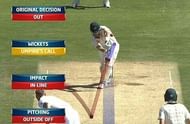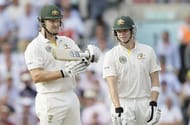It's a known fact that the vulnerabilities and deficiencies of a team become glaringly manifest soon after a loss. When things are going swimmingly, people hardly pick apart the team, believing everything to be fine and dandy. However, it's obviously not the same after a loss. There's the finger-pointing from the disappointed fans, the dressing room dressing down from the coach and of course, criticism from the media.
I had said earlier that this could be one of the more engrossing Ashes series in recent memory, purely based on the brand of cricket both teams had been playing. Well, with a victory within four days, England have surely shown their calibre by blowing away the apparent favourites. The home team have pried one finger off the urn and though the result may have come as a surprise to many, here's why we should have expected it.
1. [Insert Watson LBW joke here]
It's not fresh news, but Watson's performances have steadily diminished over the last few years. Yet, an obstinate Australia have persisted with him in the name of "experience". Correct me if I'm wrong, but experience usually translates to more consistent performances with the bat or ball. No one's expecting Watson to recreate some Jacques Kallis-style magic, but the occasional hundred or fifer would have stood him in good stead.
But that's as rare an event as a comet sighting. His performances don't warrant him a place in the side, especially with the young Mitchell Marsh banging on the door.
Now it's easy to say that Marsh deserved a nod ahead of Watson, and it’s not quite as easy to ascertain if that would have translated into a more favourable result for Australia. And yes, there is concern about Marsh's bowling and his raw talent.
But experience in these foreign conditions will truly test his potential and only aid the team's future. Yet Australia stubbornly persist with Watson, and the criticism from the media and fans alike is justified.
2. Do slow pitches make for slow Australian batsmen?
| Series | Matches | Individual Innings | Runs | Average | 100 | 50 | 0 |
|---|---|---|---|---|---|---|---|
| Border-Gavaskar Trophy (Australia in India), 2012/13 | 4 | 56 | 1507 | 27.40 | 1 | 9 | 6 |
| The Ashes (Australia in England), 2013 | 5 | 70 | 2112 | 32.49 | 4 | 11 | 5 |
| Australia in South Africa Test Series, 2013/14 | 3 | 40 | 1689 | 46.91 | 7 | 4 | 5 |
| Pakistan v Australia Test Series (in United Arab Emirates), 2014/15 | 2 | 28 | 818 | 29.21 | 1 | 4 | 3 |
| The Frank Worrell Trophy (Australia in West Indies), 2015 | 2 | 21 | 805 | 50.31 | 2 | 3 | 1 |
Note:
The only decent batting performances were in South Africa and West Indies, but here's what the stats don't show:
- On the tour to South Africa, Mitchell Johnson was at the zenith of his bowling career, aided by the bounce and pace in those pitches. Also, David Warner had a stellar series with the bat.
- On the tour to West Indies, Steve Smith and Adam Voges' performances hid the rest of Australia's batting inadequacies.
- The struggles of the batsmen in India and UAE, where only two centuries were scored across 6 matches, are well-documented.
- The averages of the top order in slow pitches is startling (especially in India and UAE).
Despite their torrid experiences on the tour to India in 2013, the previous Ashes tour to England and the UAE tour in 2014, the Australian batsmen haven't seemed to learn how to bat on slow pitches. They often succumb to mindless aggression and their batting performances are always found wanting. They lack the ability to play gritty, rear-guard cricket like the previous Australian teams under Allan Border and Steve Waugh could.
South Africa seem to be the only team which defy expectations of drawing a game to avoid defeat, and are deservedly number one in the Test rankings.
Frequently, Australia’s lower-order outperforms its top-order batsmen. And we witnessed this trend even in Cardiff. The lower-order showed more fight than the middle. Unfortunately for Australia, this time around there was no Ashton Agar to save the blushes.
Unless the Australian batsmen find a way to adapt to these conditions, the trend of home teams dominating at home will continue.
3. Clarke short of runs
| Player | Matches | Innings | Runs | Average | High Score | Strike Rate | 100 | 50 | 0 |
| Michael Clarke | 23 | 45 | 1643 | 42.12 | 187 | 55.92 | 6 | 3 | 3 |
While Watson and Haddin's inadequacies have been well documented, Clarke's inconsistency with the bat continues. After his extraordinary run with the bat in 2012, Clarke has made nine scores of 50 and above (with six centuries) in 45 innings. The remaining 36 innings include three ducks and starts which have not been converted.
Clarke keeps stressing on and on about the importance of cashing in after getting a start. Unfortunately, he is equally guilty of the said offence.
Now what?
The Australians' cocksureness about retaining the Ashes has been dented. All their words and mind games count for nothing if they don't have results to show for it. Smith and Watson, during their stint in the IPL, were more than confident that they would retain the Ashes and that "England won't come close to them".
Well, guess what? They have.
Haddin, determined on re-establishing some perspective to English cricket and their fans, wondered what all the sudden hype was about English cricket. Well, England have now given him more than a cause for wonder and concern.
Brand-new app in a brand-new avatar! Download CricRocket for fast cricket scores, rocket flicks, super notifications and much more! 🚀☄️



